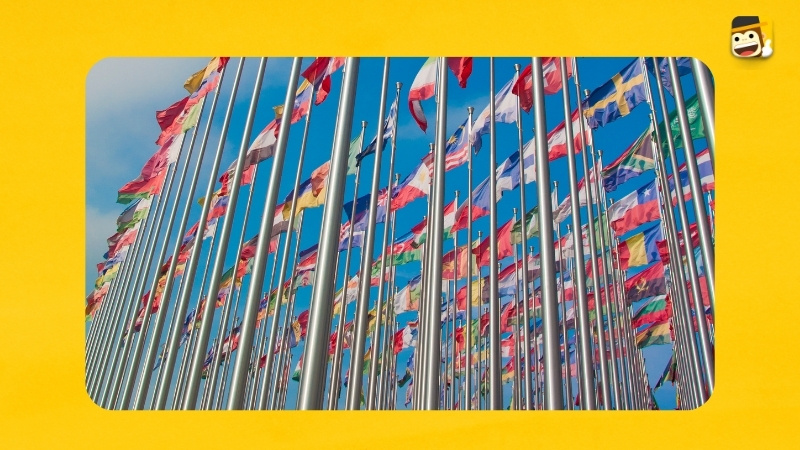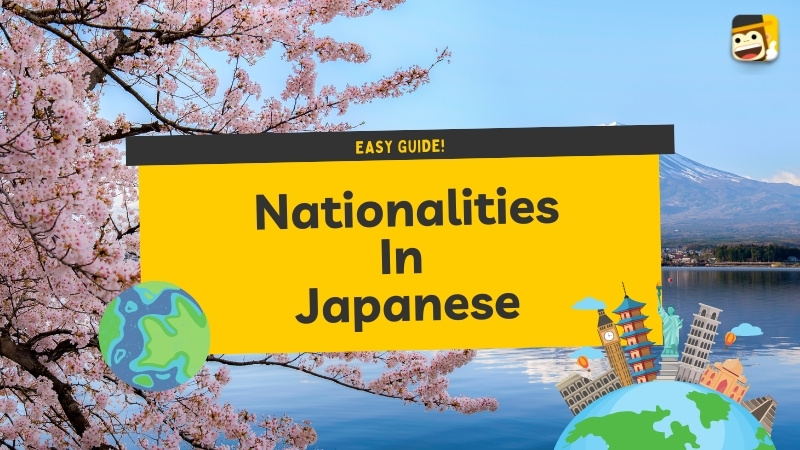Wondering what にほんじん (Nihon-jin) or にっぽん (Nippon) means? In this exclusive guide, we will walk you through the specific words used to describe country names and nationalities in Japanese so that you can start talking about where you are from and your ethnicity with the Japanese people. Fortunately, learning the translations is much easier than you can expect, as most of the words you’ll see in our complete list will remind you of the original word where it was drawn from! So, if you are up to flex your brain muscles, then start reading below.
Whether you are meeting a Japanese person face to face or online, one of the questions that you should prepare to answer is あなたはどこの出身ですか? (Anata wa doko no shusshin desu ka?) or simply “where are you from” in English. As we have shared in our previous guide, this topic is an important point to discuss, especially when you are doing your 自己紹介 (Jikoushoukai) in front of everyone since it is only natural for the locals to wonder what part of the world you are from. For them, knowing this can help them think of conversation starters with you or try to impress you by learning some words or expressions used in your mother tongue.
To help you get started, let’s first identify some of the common ways by which you can use any of the words we will learn today.
| English | Japanese | Pronunciation Guide |
| I am from ____. | 私は___出身です | Watashi wa ___ shusshin desu |
| I come from ____. | 私は___から来ました | Watashi wa ___ kara kimashita |
| I am an _____. | 私は ___人です | Watashi wa ___ jin desu |
| I live in _____. | 私は___ に住んでいます | Watashi wa _____ ni sunde imasu |
| I speak _____. | 私は___語を話します | Watashi wa _____go wo hanashimasu |
Now that we have an idea where to insert the country name and your nationality based on the example Japanese sentences on the table above, let us now focus on the commonly used translations in the next lesson below.
Nationalities In Japanese

Contrary to common belief, every language has some sort of unique name for every other nationality across the globe. If you are in search of the exact Japanese word for yours, then please review the table below.
| English Language | Japanese | Romaji |
| American | アメリカ 人 | Amerika jin |
| Australian | オーストラリア人 | Oosutoraria jin |
| Belgian | ベルギー人 | Berugī jin |
| Brazilian | ブラジル人 | Burajiru jin |
| British | イギリス人 | Igirisu jin |
| Bulgarian | ブルガリア人 | Burugaria jin |
| Canadian | カナダ人 | Kanada jin |
| Chinese | 中国人 | Chuugoku jin |
| Cuban | キューバ人 | Kyūba jin |
| Danish | デンマーク人 | Denmāku jin |
| Dutch | オランダ人 | Oranda jin |
| Ecuadorian | エクアドル人 | Ekuadoru jin |
| Egyptian | エジプト人 | Ejiputo jin |
| Filipino | フィリピン人 | Firipin jin |
| Finnish | フィンランド人 | Finrando jin |
| French | フランス人 | Furansu jin |
| German | ドイツ人 | Doitsu jin |
| Greek | ギリシャ人 | Girisha jin |
| Hungarian | ハンガリーじん | Hangarii jin |
| Indian | インド人 | Indo jin |
| Indonesian | インドネシア人 | Indoneshia jin |
| Iraqi | イラク人 | Iraku jin |
| Irish | アイルランド人 | Airurando jin |
| Israeli | イスラエル人 | Isuraeru jin |
| Italian | イタリア人 | Italia jin |
| Japanese | 日本人 | Nihon jin |
| Kenyan | ケニア人 | Kenia jin |
| Korean | 韓国人 | Kankoku jin |
| Libyan | リビア人 | Ribia jin |
| Malaysian | マレーシア人 | Mare-shia jin |
| Mexican | メキシコ人 | Mekishiko jin |
| Myanmarese | ミャンマー人 | Myanma- jin |
| Nigerian | ナイジェリア人 | Naijeria jin |
| Norwegian | ノルウェー人 | Norwē jin |
| Pakistani | パキスタン人 | Pakisutan jin |
| Perusian | ペルー人 | Peru- jin |
| Polish | ポーランド人 | Po-rando jin |
| Portuguese | ポルトガル人 | Porutogaru jin |
| Romanian | ルーマニア人 | Ru-mania jin |
| Russian | ロシア人 | Roshia jin |
| Saudi Arabian | サウジアラビア人 | Saujiarabia jin |
| Singaporean | シンガポール人 | Shingapōru jin |
| South African | 南アフリカ人 | Minamiafurika jin |
| Spanish | スペイン人 | Supein jin |
| Swedish | スェーデン人 | Sue-den jin |
| Swiss | スイス人 | Suisu jin |
| Taiwanese | 台湾人 | Taiwan jin |
| Thai | タイ人 | Tai jin |
| Turkish | トルコ人 | Toruko jin |
| Vietnamese | ベトナム人 | Betonamu jin |
Now that we have expanded your vocabulary in terms of the most common translation of nationalities in the Japanese language, it would also be wise to try out any of these words using the examples we gave you on the first table of this post. We hope that you will gain the confidence to apply in real conversations. After all, we gave your translations and the pronunciation guide in the form of romaji.
Country Names In The Japanese Language

As we had fun learning about the nationalities, let us now also learn the country names according to the Japanese language.
| English | Japanese | Romaji |
| America | アメリカ | Amerika |
| Australia | オーストラリア | O-sutoraria |
| Belgium | ベルギー | Berugi- |
| Brazil | ブラジル | Burajiru |
| Bulgaria | ブルガリア | Burugaria |
| Canada | カナダ | Kanada |
| China | 中国 | Chūgoku |
| Cuba | キューバ | Kyūba |
| Denmark | デンマーク | Denma-ku |
| Ecuador | エクアドル | Ekuadoru |
| Egypt | エジプト | Ejiputo |
| England | イングランド | Ingurando |
| Philippines | フィリピン | Firipin |
| Finland | フィンランド | Finrando |
| France | フランス | Furansu |
| Germany | ドイツ | Doitsu |
| Greece | ギリシャ | Girisha |
| Hungary | ハンガリー | Hungari- |
| India | インド | Indo |
| Indonesia | インドネシア | Indoneshia |
| Iran | イラン | Iran |
| Iraq | イラク | Iraku |
| Ireland | アイルランド | Airurando |
| Israel | イスラエル | Isuraeru |
| Italy | イタリア | Itaria |
| Japan | 日本 | Nihon |
| Kenya | ケニア | Kenia |
| Korea | 韓国 | Kankoku |
| Libya | リビア | Ribia |
| Malaysia | マレーシア | Mare-shia |
| Mexico | メキシコ | Mekishiko |
| Myanmar | ミャンマー | Myanmā |
| Nigeria | ナイジェリア | Naijeria |
| Norway | ノルウェー | Noruwe- |
| Pakistan | パキスタン | Pakisutan |
| Peru | ペルー | Perū |
| Poland | ポーランド | Pōrando |
| Portugal | ポルトガル | Porutogaru |
| Romania | ルーマニア | Rūmania |
| Russia | ロシア | Roshia |
| Saudi Arabia | サウジアラビア | Saujiarabia |
| Singapore | シンガポール | Shingapōru |
| South Africa | 南アフリカ | Minamiafurika |
| Spain | スペイン | Supein |
| Sweden | スウェーデン | Suwe-den |
| Switzerland | スイス | Suisu |
| Taiwan | 台湾 | Taiwan |
| Thailand | タイ | Tai |
| Turkey | トルコ | Toruko |
| Vietnam | ベトナム | Betonamu |
As we have reached this part of the post, we firmly believe that you can now easily use these Japanese words to express better who you are and where you are from. However, suppose you enjoyed this post and would like to learn Japanese words and phrases. In that case, we highly recommend that you check out our previous lesson guides like the parts of a traditional Japanese home, how to conduct your first jikoshoukai, and the basic Japanese greetings.
On the other hand, if you are genuinely enthusiastic about getting to know more about Japan, including its culture and language, we have a FREE language learning resource that will definitely benefit you. Continue reading to find out what it is.
Learn Japanese Today With Ling App

If you are tired of merely memorizing a Japanese word yet do not know how to use it in a full Japanese sentence precisely, then you better check out the Ling App by Simya Solutions. The Ling App is a FREE language learning resource complete with a structured course for Japanese and over 60+ other foreign languages. Aside from giving text-based examples, you’ll get instant access to audio files for you to listen to and additional gamified content that will surely keep you occupied and excited to learn!
This is an ideal platform for those who want to take their language learning on the go as it comes equipped with bite-sized lessons, challenging quizzes, and games that will reinforce your learning in as short as 10 minutes per day. Download this app on GooglePlay and AppStore today and discover a new way to learning!



































































